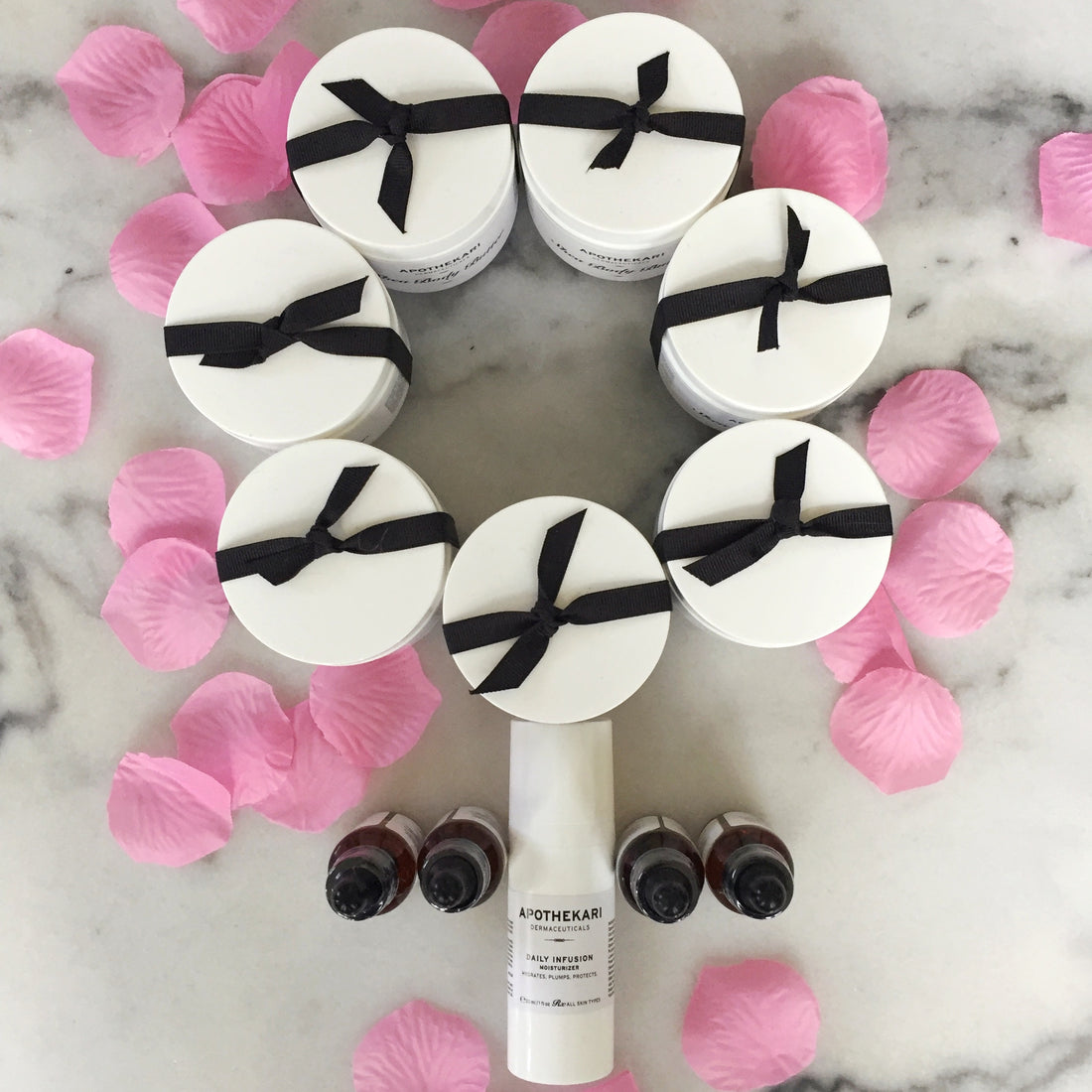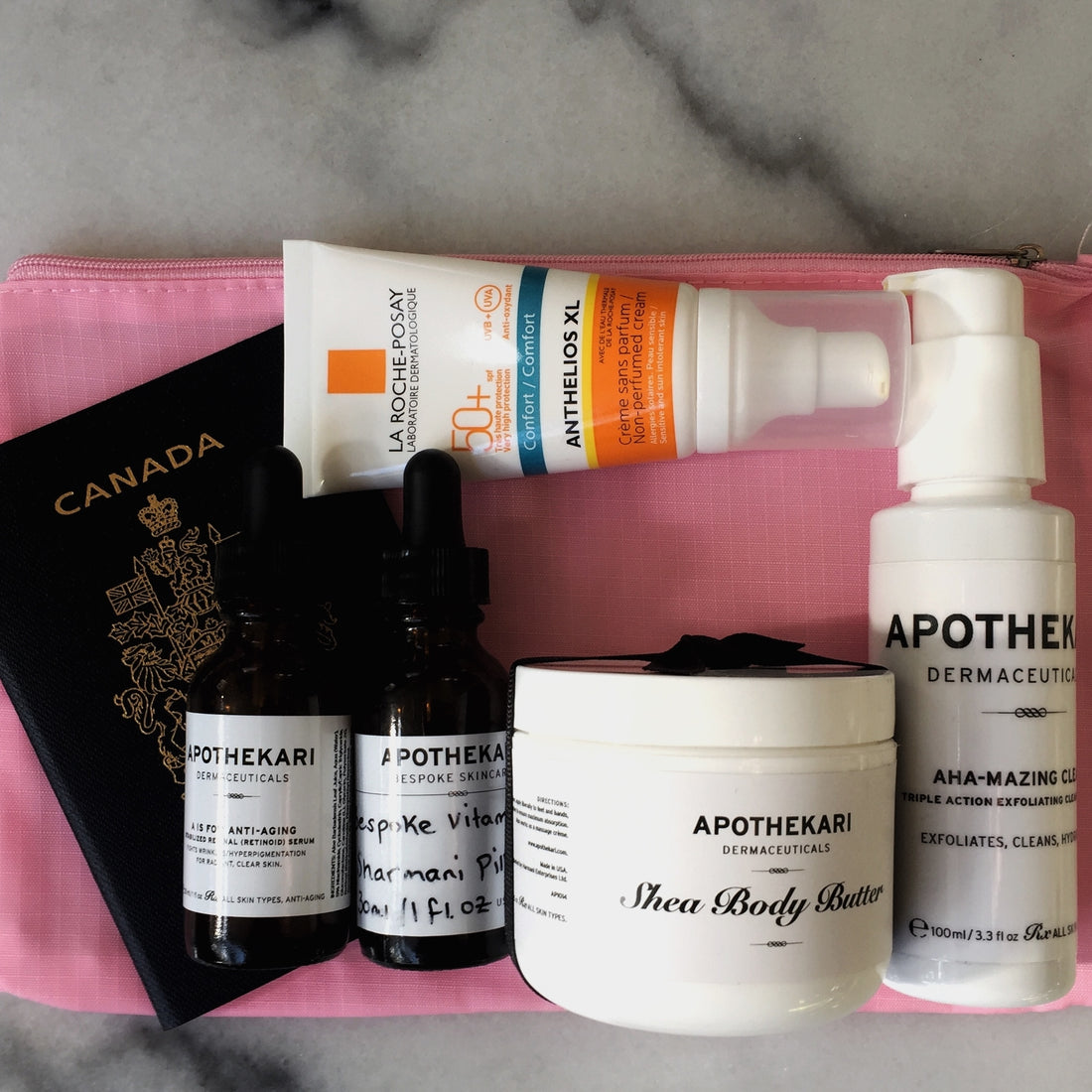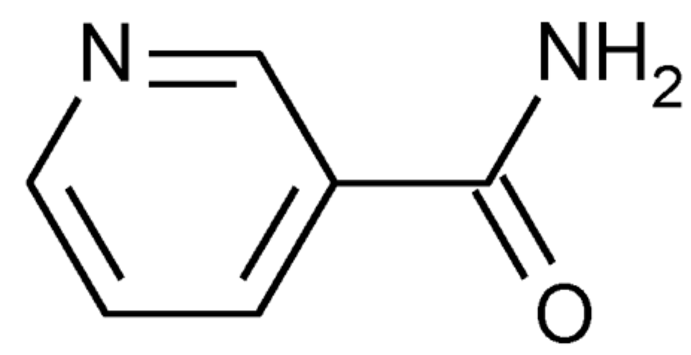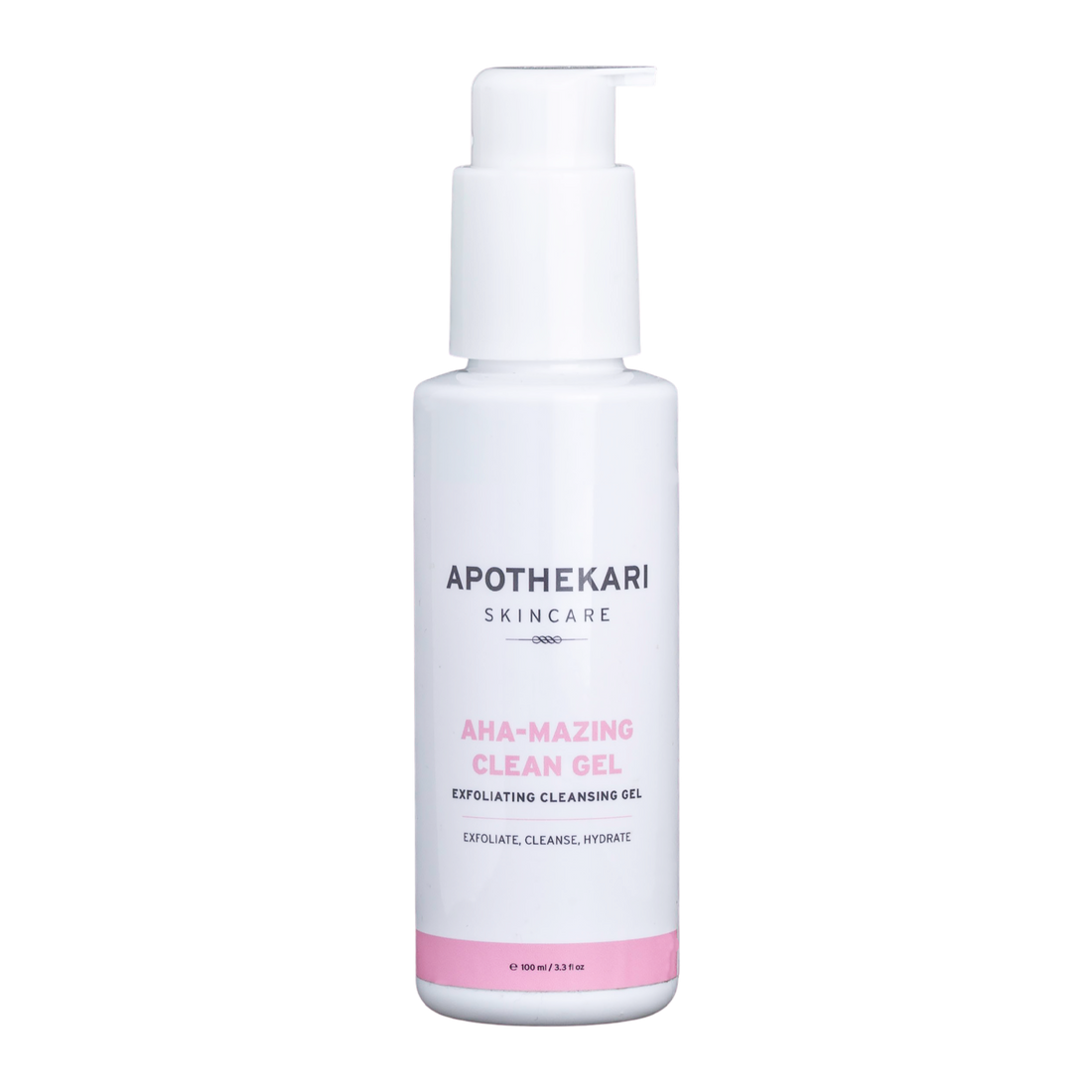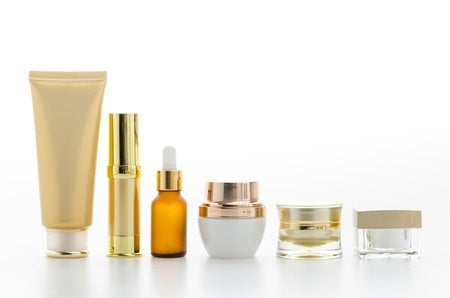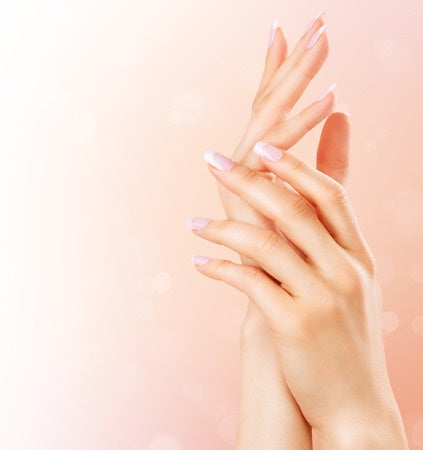Blog
Jet Lag Tips: 5 To Try
If you’ve experienced long distance travel, then you’ll know that jet lag isn’t much fun. In this blog post, I’m sharing 5 jet lag tips that have served me well. Shop All Apothekari Occurring when you experience rapid east-west or west-east travel on a high speed jet, jet lag disrupts your sleep-wake patterns leaving you feeling tired, drowsy and disoriented. It may also play havoc with your skin. Jet lag can last several days until you become fully adjusted to the new time zone. A recovery period of one day per time zone crossed is a suggested guideline. On my current trip, with a time change of 17 hours, it means that I won’t even have a chance to recover before I have to step back on the plane to fly home! Here Are My Top 5 Jet Lag Tips, Regardless of Your Destination 1. Take Melatonin An analysis of ten trials found that melatonin decreased jet lag from flights crossing five or more time zones. Doses between 0.5 and 5 mg taken close to the target bedtime at the destination (10pm to midnight), were found to be similarly effective, except that people fell asleep faster and slept better after taking 5mg than 0.5mg. The benefit was found to be greater, the more time zones crossed and for eastward flights. Melatonin is safe when taken for occasional short term use. However, caution is advised if you have epilepsy or take warfarin. As with any medicine, check with your physician or pharmacist if you’re not certain that melatonin is appropriate for you. Melatonin is available in a wide range of doses and formats – capsules, pills, sublingual (under the tongue) tablets and dissolving strips. I’m a big fan of chocolate flavored strips which melt on your tongue. Results will vary amongst individuals but I seem to have had good success by taking melatonin in transit and for about 3 days post travel both to and from my destination. 2. Stay Awake I get how tempting it may be to go straight to bed after a 12 hour+ flight. Truth is, it’s the worst thing you can do. Try and stay awake until it’s bedtime at your destination. And no naps either! Go to sleep in your new time zone’s normal bedtime hours and you’ll adjust quicker and better fend off jet lag. A good tip is to adjust your watch to your new time zone prior to takeoff. This one little step means that you are already adjusting to your new time zone. Of all the jet lag tips listed in this post, this one is non-negotiable! 3. Hydrate Airplanes maintain humidity as low as 20 per cent onboard and recirculate air throughout the cabin. Considering that the average comfortable humidity for most of us is between 40 – 70 percent, it’s not surprising that flying can be dehydrating to the skin. Studies have found that dehydration can worsen the physical symptoms of jet lag. Not only that, dry air draws moisture from wherever it can, including your skin. Dry skin becomes drier. Oily skin has an increased chance of breakouts because it will produce extra oil to compensate for the dryness. Slather on the moisturizer (and the lip balm) and drink lots of water to help fight back as best you can. 4. Avoid Caffeine and Alcohol Who doesn’t like a celebratory glass of wine at the start to the holiday? Yet, alcohol will dehydrate your body even more. Caffeine won’t necessarily dehydrate you, but it is a diuretic, which can have a dehydrating effect. The same applies to salt, which also causes dehydration. All may contribute to the symptoms of jet lag. 5. Exfoliate Flaking dry skin is often a result of the dehydration that you suffer on the plane. Cleansing with an exfoliating cleanser like AHA-Mazing Clean Exfoliating Cleansing Gel gently removes flaking skin leaving smoothness behind. Shop Aha-Mazing Clean Gel Cleanser My legs and arms gets the same treatment with Bamboo Lemongrass Foaming Body Polish. Follow up with moisturizer and your jet lagged skin will be well on its way to recovery. The only good thing about jet lag? Most of the time it means you’re about to start your holiday! Do you have any more jet lag tips to share?
Learn moreInternational Women's Day 2017
Today is International Women’s Day 2017, a day to recognize women’s achievements and acknowledge the challenges they continue to face in the quest for gender equality. The World Economic Forum predicts that the gender gap won’t close entirely until 2186! So around the world, International Women’s Day provides an important opportunity for ground breaking action that can truly drive greater change for women. Shop All Apothekari The theme for 2017 is #BeBoldForChange, calling on the masses to help forge a better working world – a more inclusive, gender equal world. As a female entrepreneur and as the mother of two teenage girls, IWD is dear to my heart. I will be submitting my #BeBoldForChange action on the IWD website. Which bold action will you declare: I’ll challenge bias and inequality I’ll campaign against violence I’ll forge women’s advancement I’ll celebrate women’s achievement I’ll champion women’s education You can also partake in events that are being held worldwide. Search for events wherever you live on the IWD site. This year, will you #BeBoldForChange ?
Learn moreSkin and Travel: What to Pack for Hot Weather
When it comes to your skin and travel in hot weather, there is one thing that all experts agree upon – bring the sunscreen! Shop All Apothekari As the countdown begins for our long-awaited family trip to Cambodia, it’s down to the nitty-gritty. All the details are done – flight booked, hotels arranged and various excursions mapped out. Now, what to pack. Like many travelers these days, I’m foregoing checked luggage for a carry-on. In addition to it being less costly, the convenience of avoiding checking in your bags and then waiting to collect them on the other side outweighs the luxury of having a different outfit to wear every day. Besides, you’re never going to see the same people every day (except for your family and they won’t care) and when it’s hot out, it’s easy to wash and wear. I’m still tweaking my clothing for my tropical getaway, but my skin travel bag details are nearly finalized. Here’s what I plan to pack: 4 Skin Care Necessities to Pack for Hot Weather 1. Anthelios Sunscreen Everyone’s favourite, including mine, this sunscreen has travelled wide and far with me and my family. This year I’m packing Anthelios XL SPF 50+ Crème (for my face) and Anthelios XL SPF 50 Kids (alas now discontinued but I have a bottle saved from last year) for long days spent outside. Formulations designed for children have staying power so when it comes to skin and travel, this one gets a thumbs up, especially in hot climates when there will be plenty of perspiration involved. We’ll be putting the kids lotion into smaller containers so that it meets travel guidelines for carry-on items. 2. Apothekari Bespoke Vitamin C 10% Serum This high potency antioxidant serum, featuring L-ascorbic acid is something I apply daily under my sunscreen. Its ability to fight free radicals generated by pollution and UV rays encountered when you put skin and travel together, can’t be dismissed. 3. Apothekari A is for Anti-Aging Retinal Serum I have been applying this wonderful hydrating serum nightly for many years now. It forms the backbone to my skin care regimen and I never leave home without it. In addition to helping skin to regenerate, it helps to protect against damage from UV rays and inhibits skin pigmentation, which can be exacerbated upon exposure to intense sunlight. 4. Apothekari AHA-Mazing Clean Exfoliating Cleansing Gel I tend to switch things up between AHA-Mazing Clean and Cloud Nine Foaming Cleansing Crème. After a long winter (this year has been a very long one indeed!) of super gentle cleansing, I’m ready for one that exfoliates. If you think I’ve forgotten the moisturizer, it’s one product that I generally skip when travelling to hot climates. My face loves the humidity and dryness is never an issue. However, when it comes to my body, especially my legs, that’s a different story. Especially if I’ve been out in the sun all day. Apothekari Shea Body Butter (transferred to a smaller jar) helps to alleviate dryness. Not a surprise at all, but perusing skin care products when I travel is something I love to do so I may come home with a treat or two. Now to get packing and arrange the very last details. Which novels am I taking – I devour them when I travel – how many pairs of shoes and oh, I mustn’t forget the antiperspirant. If spring break takes you afar this year, bon voyage!
Learn moreNiacinamide Skin Care
You may be using a niacinamide skin care treatment without even knowing it. Also known as Vitamin B3, niacinamide isn’t as well known as retinoids, antioxidants or AHAs. However, it’s a powerhouse ingredient that comes with no shortage of benefits when used as part of a regular skin care regimen. Think of niacinamide as the quieter, heads down colleague who always delivers on time. Just like that co-worker, who may never get the recognition, niacinamide really, really needs to be on your team! Shop A Is for Anti-Aging Serum (Our Retinoid Formulation) Niacinamide is found in all our bodies with a large concentration found in tissues like the brain, heart, liver and skeletal muscle. It plays an important role in energy production. For those of you interested in the science, niacinamide works by reducing the rate of decline of two important enzymes (NADH and NADPH) which are involved in cellular energy production and fats that are responsible for cell growth. Foods rich in niacinamide include yeast, meat, milk, and green vegetables. Niacinamide Skin Care Niacinamide skin care products have the following beneficial properties: Anti-inflammatory, thereby useful in conditions including psoriasis, rosacea and acne Stimulates collagen production Prevents moisture loss Increases ceramide (lipid) production Lightens pigmentation and evens skin tone. Formulators Include Niacinamide in Their Treatments to Treat: Dry skin The appearance of wrinkles and fine lines Pigmentation and Acne breakouts. One study compared niacinamide 4% to Clindamycin (a popular prescription treatment for acne) and noted that they were equally effective in controlling breakouts. Niacinamide skin care therapies are beneficial for younger skin burdened by acne and they also benefit more mature skin. Our favourite niacinamide skin care product is Apothekari A is for Anti-Aging. In this treatment, it is combined with other actives to deliver antioxidant, skin brightening, anti-acneic, skin smoothing and skin hydration benefits. his is my go to serum at night and it’s one that I wouldn’t give up, ever!
Learn moreNatural Beauty – 6 Tips; No Product Required
Wouldn’t it be great if we could all be a natural beauty? Although you may think that you need to drop a ton of cash at the beauty counter, it’s not necessarily a must. True, there are many treatments that offer numerous benefits to skin, but there are also many things we can do that don’t cost much at all. Shop All Apothekari Here Are 6 Natural Beauty Tips That Won’t Break the Bank: Fall in Love. (We know. Easier said than done. But, if you can…) Scientists have discovered that ‘love struck’ couples have high levels of the neurotransmitter dopamine in their brains. Dopamine is involved in proper skin functioning and a healthy appearance as it supports an appropriate supply of blood to the cells by increasing circulation. Hello, natural blush! They Don’t Call it Beauty Sleep for Nothing. Nighttime is when skin regenerates and repairs itself. Try to get seven hours a night as often as possible. And make sleep a priority – it’s a necessity, not a luxury. And no, you can’t catch up on weekends. Exercise. Not only good for the waistline and the heart, it’s also good for the skin. Exercise helps deliver oxygen and nutrients to the skin and will keep you young-looking and healthy. Research out of McMaster University in Ontario, found that people over the age of 40 who exercise regularly have healthier skin. In fact, the study showed their skin to be closer in composition to that of 20- and 30-year-olds. Calm Down! Stress releases hormones like cortisol that can exacerbate acne and breakouts. Take mini breaks during the day to walk or chat with friends. Calming activities trigger your brain to quit producing cortisol, a pimple culprit. Minimize Squinting. Squinting can accentuate and lead to fine lines. Wear sunglasses even when it’s cold and cloudy as UVA rays – those responsible for skin aging – still seep through. Eat Well. What constitutes eating well has become a very complex topic indeed, making it increasingly difficult to go there. I don’t think any of us can dispute it’s a good idea to load up on your leafy greens. Beyond that, I think Michael Pollan summarizes it best, “Eat food. Not too much. Mostly plants.” What do you think of these natural beauty tips? Do you have any to share?
Learn moreSugar Face, Sugar Skin
Sugar Face (aka sugar skin) is a term that we are starting to hear more often. It’s become a trending topic as we begin to increasingly appreciate the detrimental effect that sugar has, not only on our health, but on our skin as well. Shop All Apothekari Does Sugar Ruin Your Face? You may think of sugar face as a topic discussed only amongst celebrities, but dermatologists and nutritionists are talking about it as well. Just how does sugar age us? A recent scientific review discusses how the consumption of sugar reacts with proteins, creating elements called advanced glycation end-products (AGEs). First described in the context of diabetes, AGEs are formed through a type of non-enzymatic reaction called glycation. In the skin, these substances lead to: Wrinkled skin Sagging under the eyes A gaunt look to the face Thinning of the skin Painful pimples Hardened cell structures. Think of the way arteries harden to cause coronary heart disease. The process is similar in skin cells. Sugar can also weaken the body’s immune system, leaving it less able to fight off bacteria, which may be implicated in acne. Sugar face or sugar skin results in a detrimental impact on your appearance. But, the health risks of excessive sugar consumption can be great too. Along with an increased risk of things like type 2 diabetes, eating too much refined sugar creates inflammation in the body, which can increase the risk of heart disease and cancer. When blood sugar levels drop, stress hormones are released resulting in anxiety and tension as common side effects. The immune system may also be impacted affecting thyroid function, energy levels and digestion. How Long Does it Take to Get Rid of Sugar Face? If you’re trying to avoid sugar, you should be mindful of foods where sugar is more hidden. Fruit juice, fruit and ‘sugary’ vegetables like beets and carrots are also high in sugar. Pay attention to where a food falls on the glycemic index and seek out those that rank lower, which will help to slow down glycation. You don’t have to cut out fruit completely but think of it as a treat, opting for a diet that consists mainly of leafy green vegetables, lean proteins and healthy fats. Think you can never have cupcakes again? Take heart. Great skin is made up of a combination of factors including genetics, skin care, along with environmental and lifestyle factors. Sugar, an inflammatory food, ranks high on the list of things to avoid, but you should also be paying attention to protection from environmental toxins (like pollution and UV rays), managing stress and getting adequate sleep. Thankfully, it’s never too late for lifestyle changes. Sugar can speed up aging, but adopting healthier habits and a great skin care routine can start to slow this process – whatever your age. Sugar face? We’ve got you beaten! In previous posts, we’ve discussed the other three faces that the doctor describes: Gluten Face – Characterized by a range of symptoms including psoriasis, eczema, acne or dry skin. Wine Face – Typically associated with individuals who consume one or two glasses of wine or other alcohol most nights of the week, skin becomes dehydrated, making fine lines and wrinkles look worse. The face may become red and make the individual appear older. Dairy Face – Characterized by a range of symptoms including swollen eyelids, bags and under eye dark circles, small white spots and bumps on the chin.
Learn moreApothekari AHA-Mazing Clean: New Formulation
Lovers of our Apothekari AHA-Mazing Clean Exfoliating Cleansing Gel will be happy to know that it is available again! A slight reformulation of this cleanser results in a more gentle, but just as effective exfoliating treatment, suitable for most skin types, except sensitive. The three major ingredients in Apothekari AHA-Mazing Clean Exfoliating Cleansing Gel will help to improve skin’s overall appearance, smoothing fine lines and wrinkles, gently exfoliating clogged pores and promoting cellular renewal. Shop Aha-Mazing Clean Gel Cleanser Apothekari AHA-Mazing Clean Exfoliating Cleansing Gel was tweaked to remove the sugar cane extract while still retaining the combination of three alpha hydroxy acids (AHAs): Lactic Acid. Simultaneously hydrates and exfoliates, while also reducing fine lines and wrinkles. Lactic Acid also works wonders at evening out pigmentation discolorations. Malic Acid. Gentle exfoliation, skin smoothing and promotes cellular renewal. Derived from apples. Tartaric Acid. Improves the skin’s ability to retain hydration and exfoliates, further smoothing skin. This cleanser is an elegant white pearl liquid that contains the beautiful combination of Peppermint and Spearmint Oil. It is paraben free, gluten free and sulfate free. Apothekari AHA-Mazing Clean Exfoliating Cleansing Gel works best when used as part of your regular skin care regimen. Use once or twice daily for best results.
Learn more7 Facts About Valentine's Day
Here are 7 facts about Valentine’s Day, that ‘holiday’ in February we know and associate with hearts, roses and romance. Whether it’s a holiday that you embrace or one that you despise, Valentine’s Day’s beginnings are rooted in both Christian and ancient Roman tradition. Shop All Apothekari Beyond cupids and the Saint that is the namesake of this day, here are 7 facts about Valentine’s Day that you may not know: You may know that Valentine’s Day is celebrated in the middle of February to commemorate the anniversary of Saint Valentine’s death or burial–which probably occurred around A.D. 270. However, did you know that there were at least three early Christian saints who went by Saint Valentine? Most academics agree that the St. Valentine of the holiday was a priest who attracted the disfavor of Roman emperor Claudius II around 270. According to one legend, Claudius II had prohibited marriage for young men, claiming that bachelors made better soldiers. Valentine continued to secretly perform marriage ceremonies but was eventually apprehended by the Romans and put to death. Another legend has it that Valentine, imprisoned by Claudius, fell in love with the daughter of his jailer. Before he was executed, he allegedly sent her a letter signed “from your Valentine.” Others claim that the Christian church may have decided to place St. Valentine’s feast day in the middle of February in an effort to “Christianize” the pagan celebration of Lupercalia – a fertility festival dedicated to Faunus, the Roman god of agriculture, as well as to the Roman founders Romulus and Remus. It wasn’t until the 14th century that this Christian feast day became definitively associated with love. According to a medieval scholar, it was the poet, Chaucer who first linked St. Valentine’s Day with romance. In 1381, Chaucer composed a poem in honor of the engagement between England’s Richard II and Anne of Bohemia. As was the poetic tradition, Chaucer associated the occasion with a feast day. In “The Parliament of Fowls,” the royal engagement, the mating season of birds, and St. Valentine’s Day are linked: For this was on St. Valentine’s Day, When every fowl cometh there to choose his mate. By the 18th century, gift-giving and exchanging handmade cards on Valentine’s Day had become common in England. This tradition spread to the Americas, where hand-made cards made of lace, ribbons, and featuring cupids and hearts were given. It wasn’t until the 1840s that the tradition of Valentine’s cards became widespread in the United States, when a native of Worcester, Mass., Esther A. Howland began selling the first mass-produced valentines in America. Howland, known as the “Mother of the Valentine,” made elaborate creations with real lace, ribbons and colorful pictures known as “scrap.” Women purchase approximately 85 percent of all valentines. Today, according to the Greeting Card Association, an estimated 1 billion Valentine’s Day cards are sent each year, making Valentine’s Day the second largest card-sending holiday of the year. (An estimated 2.6 billion cards are sent for Christmas.) According to a 2015 survey by digital coupons website RetailMeNot.ca, 78 per cent of Canadians feel Valentine’s Day is an overrated occasion. Whether you’ll be partaking or not, here at Apothekari, we’d like to show you some love for Valentine’s Day. Until February 15th, every online purchase qualifies for FREE SHIPPING (code love2017 at checkout) and a generous 1 oz jar of our Bamboo Lemongrass Foaming Body Polish. No code is needed for this special gift and it’s included with every purchase at our online store. It’s our way of showing our appreciation. Hope you found these 7 facts about Valentine’s Day interesting – I learned something writing it! Happy Valentine’s Day from us all at Apothekari!
Learn moreSending Love for Valentine's Day
In honour of Valentine’s Day this month and to show our appreciation, we’d like to send some love your way! Starting today (February 8th) and until February 15th, 2017 our gift to you is a 1 oz jar of our indulgent and ever so popular Bamboo Lemongrass Foaming Body Polish. No code needed and this special gift is included with every purchase at our online store. PLUS for some extra love, all orders ship free! For free shipping use code love2017 at checkout. Shop All Apothekari Everyone loves this luxurious polish, which tackles even rough knees, elbows and feet, leaving skin feeling soft and smooth. For a little bit of extra pampering follow up with our Shea Body Butter – made with healing herbs, fresh oils, natural vegetarian waxes and an intoxicating blend of essential oils to heal dry, cracked and callused skin. Whatever you do this month, take time to honour yourself – you deserve it!
Learn moreCream or Lotion? Then There's The Serum...
If you’ve ever wondered whether you should be using a cream or lotion – or perhaps a serum – you’re not alone! Cosmetics companies are free to use whatever descriptors they like for their products as there isn’t an absolute definition for any of these terms. Broadly speaking, however, there are some differences: Creams are made by mixing oil with water. They tend to be moisturizing by nature. In addition to hydrating and emollient ingredients, creams may contain a range of additional actives including antioxidants, skin lighteners, cell-communicating ingredients, etc. Think of creams as thicker based products, most often suited to normal or dry skin types. Sometimes called fluids, lotions are similar to creams in that they contain both oil and water. They too, can contain emollients and hydrating ingredients, but they are lighter in consistency than creams. Lotions may be used by all skin types but those with oilier skin may find them too heavy. Lotions, like creams, may be moisturizing and can contain a range of active ingredients. Serums are thick liquids, which are often, but not always, clear. They are sometimes referred to as gels. Serums are water based, making them lightweight and suitable for all skin types. Serums are an excellent delivery system for all manner of active ingredients, including antioxidants, AHAs, peptides and retinoids. Because they are so light, they are ideal for layering under creams and lotions, without interfering with their activity. If you think you’ve got it all figured out – cream or lotion or serum – hold on a minute! Now, there’s also the ‘essence’. Popular throughout Asia, many brands now offer essences in addition to these three treatments. Shop Moisturizers Shop Apothekari Serums My research reveals that essences are a way to deliver targeted actives to skin – much like serums. In fact, there doesn’t seem to be much difference between the two. Essences may sound exotic but they are essentially serums; two names for the same product. Whether you opt for a cream or lotion, or a serum or essence, is irrelevant. What’s most important is that it suits your skin type, it contains ingredients that deliver and that it fits your budget.
Learn morePollution Protection. It's a Thing!
If you care about your skin, you may have been reading about pollution protection. Just when you think you’ve got this whole skin care thing figured out, along comes something new! And yes, it’s a big thing. SHOP RADIANT SKIN SET Is this fear mongering or is pollution protection something we should really be concerned about? From free radicals to environmental attacks and noxious gases, the headlines make it sound like the air is out to get us. We already know that environmental pollution in the form of poor air quality is a major health problem worldwide. And now, we are starting to recognize the significant effects of air pollution on the skin as well. A recent study shows that cigarette smoking and soot levels are known to promote clinically visible skin changes. And, more recent information, demonstrates the association between NO2 levels (generated from combustion such as from vehicles), and cheek lentigines (brown spots) in 50 year olds from Germany and China. Before rushing out to buy pollution protection treatments, it’s important to understand just what we are protecting ourselves against. It’s suspected that ozone – the toxic gas that forms when UV light hits mono-nitrogen oxides (from combustion exhaust) – is one of the primary causes of pollution-related skin damage. Ozone is thought to damage skin by oxidizing the lipids (fats) that bind our skin cells together, resulting in a cascade of DNA-damaging events. Isn’t Sunscreen Enough? If you apply sunscreen daily, you’re off to a good start. Sunscreens protect skin against damaging UV rays, but they aren’t necessarily going to offer much in the way of pollution protection. When it comes to pollution protection, antioxidants – Vitamins C and E, green tea, alpha lipoic acid, resveratrol and retinoids, for example – are your best friends. Antioxidants work by binding to free radicals – unstable molecules generated by pollution – and counteracting them before they damage cells. One single ingredient can’t do the job, so don’t get caught up in the hype of finding the “best” antioxidant as it doesn’t exist. Instead, there are lots of good ones, so the more, the merrier! Don’t stop with the antioxidants at night. Pollution is around 24/7, day and night, so you need to use antioxidants at night too. Other tips include cleansing (to remove dirt and grime, which contain particulate matter, the tiny harmful particles in the air) and skin barrier repair with good moisturizers. Keeping your skin strong and healthy helps to keep harmful things out. Those of us at Apothekari wouldn’t dream of starting our days without Apothekari Bespoke Vitamin C Serum. Available in both a 10% and 15% concentration, this is the first thing we layer on every morning under our sunscreen. Loaded with free radical fighting vitamins C and E along with other potent actives, it’s one of the best pollution protection products available anywhere. At night, you can’t beat A is for Anti-Aging, which boasts antioxidant rich retinaldehyde and niacinamide. Pollution Protection? We’ve got you covered!
Learn moreThe Hand Lift Is Here!
The hand lift is here! Beyond Botox, face lifts, nose jobs and fillers, hand lifts are becoming de rigueur. Yes, the face is one of the most age-telling body parts we have. However, the hands are a dead giveaway too. Skin on the back of our hands is extremely thin and the loss of fat padding shows as we age. Our hands become less firm and plump. Tendons, bones and veins become more visible and the hand appears bony and more fragile. Daily exposure to UV rays results in the appearance of age spots and brown patches. Shop All Apothekari The ‘hand lift’ is fast and touted to be a simple procedure that can convert older-looking hands into younger looking ones in minutes. First, fillers are injected to plump and replenish volume to the back of the hands and to provide a supple and youthful appearance. The resulting raised skin level makes tendons, joints and veins lose their prominence. Next, laser treatments may be used to diminish the appearance of brown spots and pigmentation. With hands looking years younger, patients are then encouraged to protect and maintain results at home by keeping hands well moisturized and protected with sunscreen. Although the procedure takes less than 10 minutes, the cost may leave a larger impression on your wallet. At $1200 for a treatment, it definitely isn’t for everyone. Lower Cost Alternatives to the Hand Lift? If you’re afraid of medical procedures or just can’t imagine paying for a hand lift, take heart. By applying the same principles of good skin care to your hands as you do to your face, you may not need that hand lift after all! Here are 5 low-budget steps you can take to younger looking hands: 1. Sun Protection The sun is responsible for most skin aging and is a particular culprit in skin discoloration. Apply a good sunscreen to the backs of your hands daily. 2. Retinoids They work to boost the production of collagen and elastin thereby maintaining skin’s structural integrity. In this case, what’s good for the face is definitely good for the hands. Try A is for Anti-Aging Retinal Serum. 3. Don Gloves Yes it’s a pain, but you’ll get used to it. Water, especially the hot water we use to wash dishes, is the hands’ enemy as it can wash away the lipids that hold in moisture. 4. Moisturize Restore the skin’s barrier system with a moisturizer containing humectants and emollients to seal in moisture. Our Shea Body Butter has a permanent home at my kitchen and bathroom counter. 5. Exfoliate Get rid of dry skin with a body polish like our Bamboo & Lemongrass Foaming Body Polish. Hands will feel and look soft and smoothe. In a world of selfies, it’s a given that the hand lift is here to stay. Is it right for you?
Learn more


